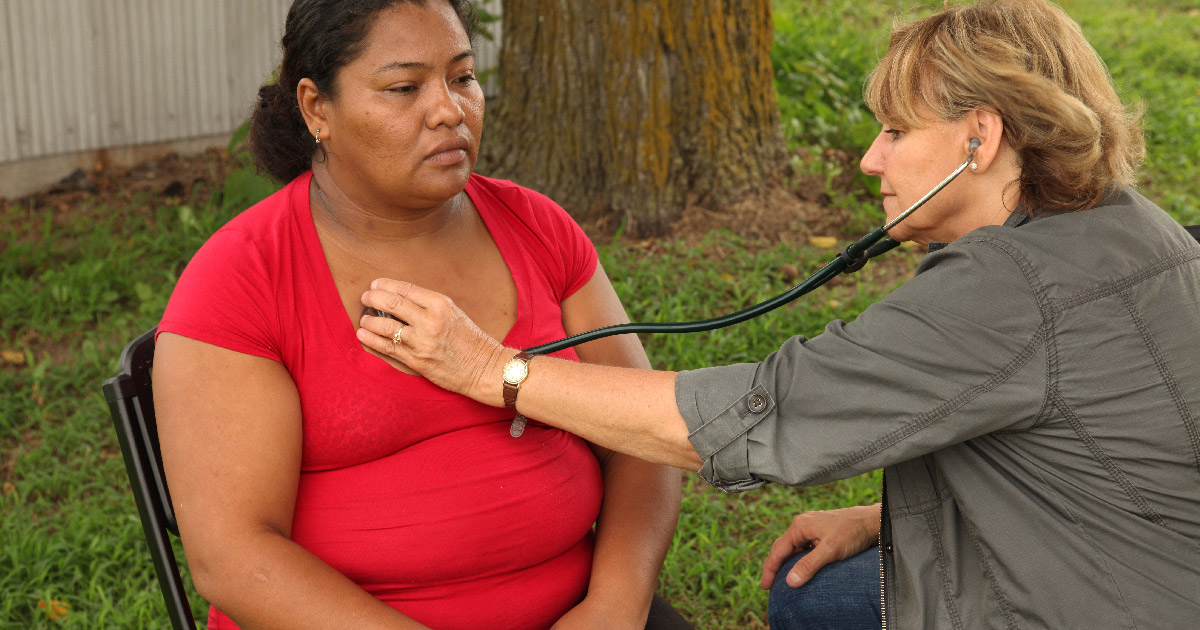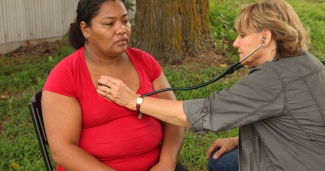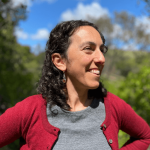Clinician Action Today: Why Public Charge Affects Public Health

[photo by Earl Dotter]
Today is the final day for public comments on the Trump Administration’s proposed changes to public charge. Despite the proposal not yet being into effect, the consequences are already being felt.
“Our health centers are telling us that some people are dropping their insurance,” explained Robert Moore, MD, MPH, MBA, the Chief Medical Officer of the Partnership HealthPlan of California and Migrant Clinicians Network Board Chair Emeritus. “For some children who qualify for Medi-Cal, their parents are taking them off. For adults who qualify, they are discontinuing.”
“Public charge” rules determine whether a lawfully residing immigrant may depend on government subsidies for their primary financial support. “If the government determines that someone is likely to become a ‘public charge,’ that person can be refused permission to enter the U.S. and refused a green card,” explains Protecting Immigrant Families, a campaign to which Migrant Clinicians Network is a member. The new changes, however, are forcing immigrants to choose between the health care for which they are eligible, and legal status. The dangers of such a policy -- one in which lawfully residing immigrants don’t have health insurance -- are playing out before our eyes here in California.
Dr. Moore has seen a monthly decline in the number of people on Medi-Cal in the last six months. While some of that decline may be the result of other factors, such as an improving economy, he worries that some of the decline in coverage is due to the proposed changes in public charge.
“Anecdotally, our health centers have told us of patients who say, ‘take me off of Medi-Cal -- I don’t want to have that on my record,’” explained Dr. Moore.
Irmina Haq, MD, MPH, a family physician in Long Beach, fears that the proposed changes build on the distrust that her patients were already feeling as a result of the current administration's immigration policies and local increases in ICE deportations. The majority of her patients are immigrants and eligible for Medi-Cal, but she has grave concerns of the consequences on the health of the entire immigrant community. “It will have a chilling effect beyond those directly affected by the policy, because it strengthens the culture of mistrust that we’re already seeing,” she said.
“The intent of Congress in creating Medicaid was not to exclude people who are here legally, but because people are dropping their Medicaid coverage, that will the effect when [the Administration] redefines public charge” in this way, he said. He understands why people are opting out anyway, to assure their immigration status. “These are rational choices -- they don’t know what is going to happen (with the details for the public charge regulation), they are willing to take the risk of not being covered, hoping they will stay healthy.” Some may not be so lucky.
In addition to the substantial human cost, Dr. Moore points to the costs to the California health care delivery system, which will result in higher premiums for those who are insured, and strained clinics and hospitals. “Hospitals will lose money,” he noted. “Many [hospitals] are already struggling, especially rural hospitals,” and when a person without health insurance arrives at the emergency room, the hospital is in many cases obliged to serve him or her. Some of the cost will be recouped through patient fees, but such out-of-pocket payments are usually much lower than health insurance reimbursements, he said. Health centers, too, will be affected. “It could impact their bottom line significantly -- their ability to hire doctors and find doctors, and their fixed costs will no longer be met by the much lower reimbursement from sliding fee scale,” he said.
More emergency room visits will be by uninsured people whose injury or illness could have been less expensively and more effectively treated earlier, in a primary care setting, but many patients, without insurance, will put off care until their health concern is no longer manageable at home. Additionally, fewer people will be paying into the health plans, which will raise costs for all. “There are economies of scale; there are fixed costs and marginal costs, so when there are less individuals enrolled, the relative contribution to fixed costs is higher and it becomes more expensive for the smaller number of enrollees,” Dr. Moore explained.
But Dr. Moore also states that clinicians can and should be part of the discussion. “It’s important for individuals to step forth,” he said. “Our physician trade organizations are weighing in, and we as individuals should weigh in.” Dr. Haq agrees: “We have the public comment period, which concludes on December 10th. We need to detail how this change will affect our part of the health care delivery system. We can then use that to show our policy-makers the serious consequences of this policy.”
Many groups have already opposed the public charge rules, including the American Academy of Pediatrics, the American Academy of Family Physicians, and Migrant Clinicians Network. Both Dr. Haq and Dr. Moore encourage clinicians to use their voices as engaged and trusted members of the community to share concern over the proposed changes, both formally on the comment line and within the community. Comments are being accepted only until today, December 10th. Learn more and make your comment at www.protectingimmigrantfamilies.org.
Like what you see? Amplify our collective voice with a contribution.
Got some good news to share? Contact us on our social media pages above.
Return to the main blog page or sign up for blog updates here.
- Log in to post comments


